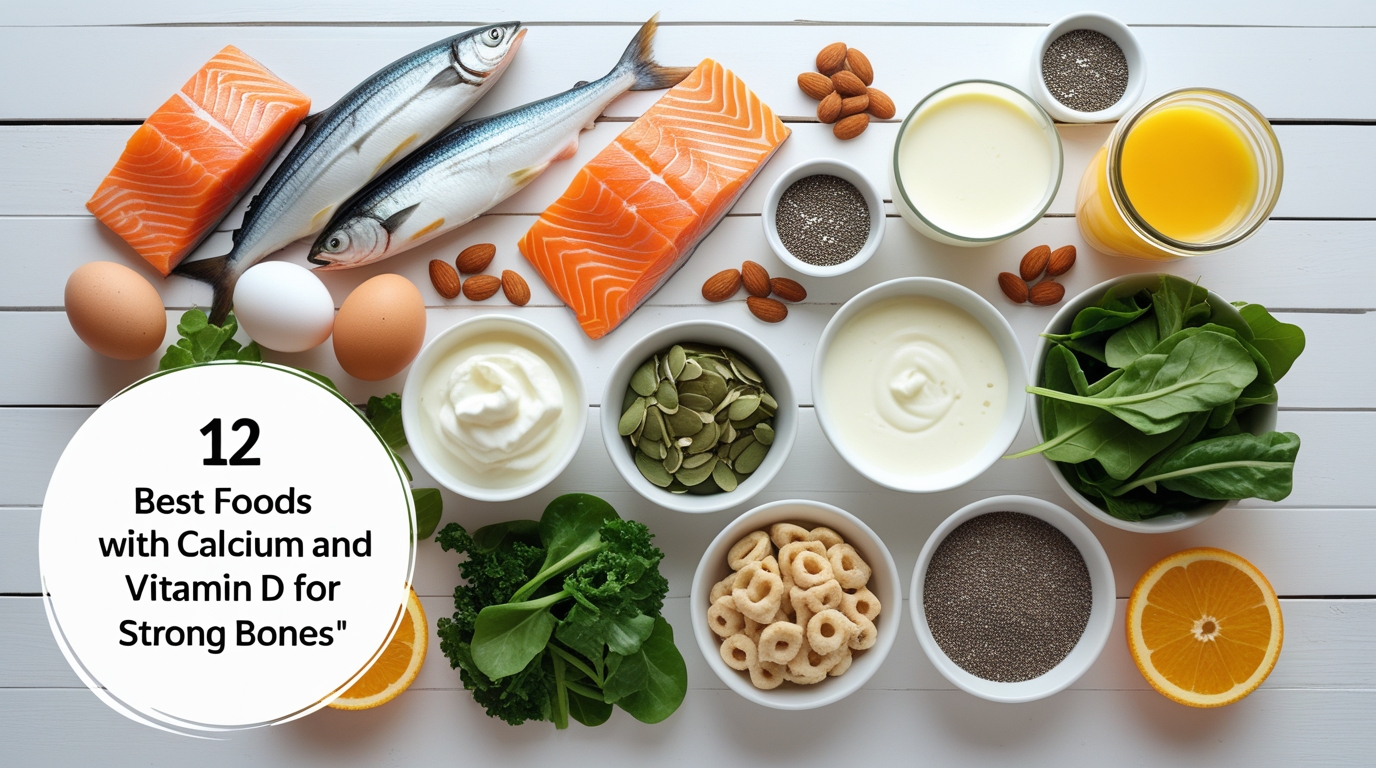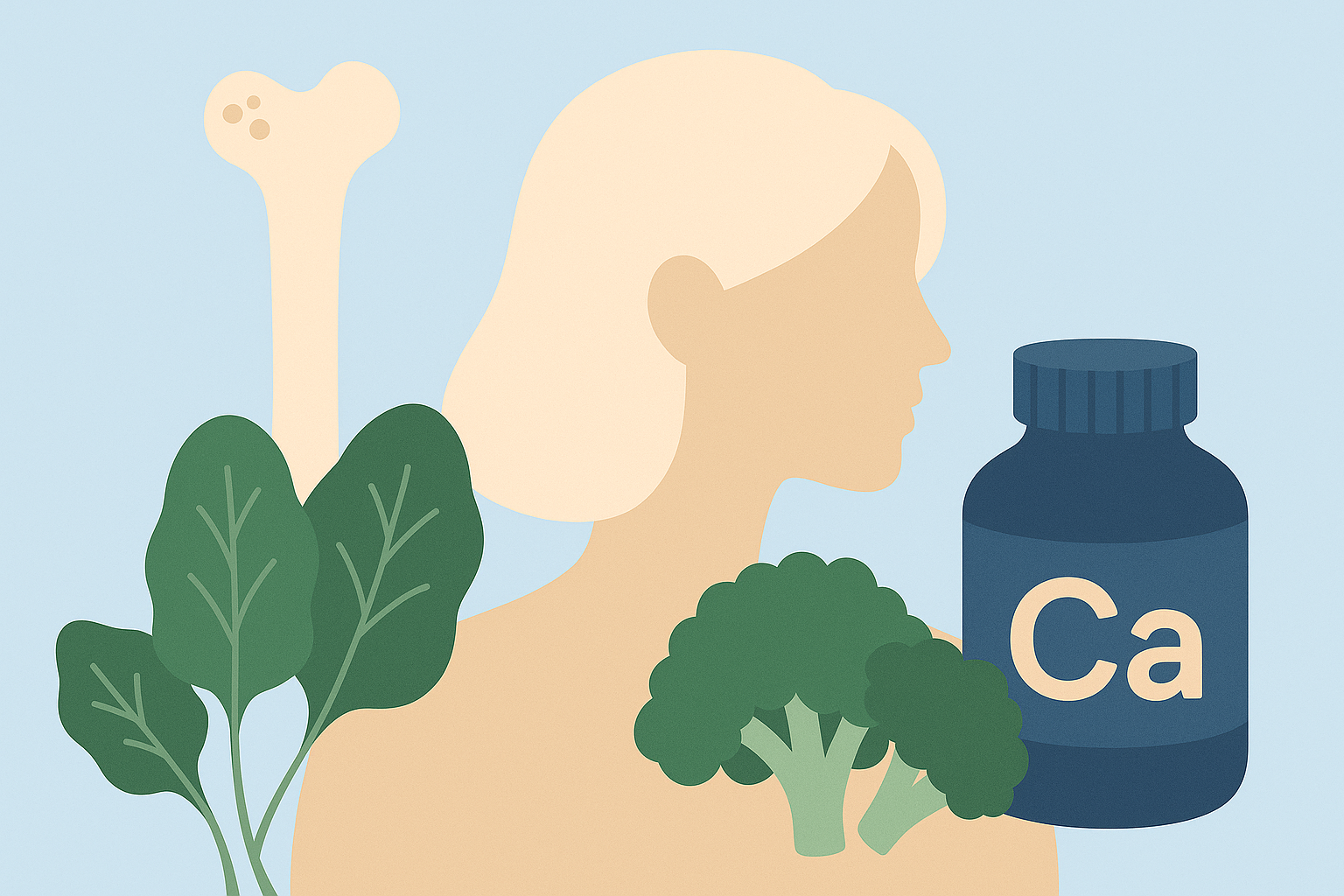Introduction: Why You Must Prioritize Foods with Calcium and Vitamin D for Bone Strength
Your bones are living tissue, continuously being broken down and rebuilt. To keep them strong and healthy, two nutrients are essential: calcium and vitamin D. One of the best ways to maintain healthy bones is by eating a variety of foods with calcium and vitamin D. Calcium acts as the primary building block of bones, while vitamin D enables your body to absorb it effectively. A deficiency in either can cause bones to become brittle and weak, increasing the risk of conditions such as osteoporosis, particularly in women and older adults.
Relying only on supplements isn’t ideal. Your body absorbs nutrients best from food. That’s why it’s essential to understand which natural foods contain both calcium and vitamin D—and how to combine them for optimal bone support.
In this article, you’ll discover:
- The top foods with calcium and vitamin D
- Best combinations to absorb both nutrients
- How magnesium plays a vital supporting role
- Whether supplements are necessary
- FAQs and expert insights
Let’s build your bones the natural way—deliciously and affordably.
Top 12 Foods with Calcium and Vitamin D: Daily Essentials for Bone Strength
1. Fatty Fish (Salmon, Mackerel, Sardines)
These fish are bone-health superfoods.
- Salmon (especially wild-caught) contains around 250 IU of vitamin D and 20 mg of calcium per 3-ounce serving.
- Sardines (with bones) are excellent: 325 mg calcium and up to 200 IU vitamin D per 3 oz.
- Mackerel gives a nice balance of both nutrients.
Pro Tip: Always eat sardines with their bones for the calcium boost.
2. Fortified Milk and Plant-Based Milks
- Cow’s milk naturally has 300 mg of calcium per cup and is usually fortified with 100 IU of vitamin D.
- Fortified plant milks (like almond, soy, oat) often offer similar levels, but check the label.
- Ideal for vegans or lactose-intolerant individuals.
Explore more Calcium-Rich Foods here
3. Cheese (Cheddar, Mozzarella)
- Most cheeses are rich in calcium but low in vitamin D.
- Cheddar: ~200 mg calcium per ounce
- Best when paired with vitamin D sources like eggs or fortified juice.
4. Egg Yolks
- Each yolk gives around 40 IU of vitamin D.
- Also, a source of vitamin K2, another nutrient for bone strength.
5. Dark Leafy Greens (Kale, Collard Greens, Mustard Greens)
- One cup of cooked collard greens = ~250 mg calcium
- Spinach contains calcium, but your body absorbs less of it because of oxalates.
6. Tofu (Calcium-set)
- If calcium sulfate is added, half a cup can provide up to 350 mg of calcium.
- A great vegan option with plant protein.
7. Nuts and Seeds
- Chia seeds: ~175 mg calcium per tablespoon
- Almonds: ~75 mg per ounce
- Add to smoothies, oatmeal, or salads for an easy boost.
8. Fortified Cereals and Juices
- Some cereals are fortified with up to 100 IU vitamin D and 100–200 mg calcium per serving.
- Fortified orange juice is also a good combo.
For a complete guide on vitamin D sources, read this:
9. Canned Tuna
- Each 3-ounce serving provides around 150 IU of vitamin D.
- Also, a budget-friendly source of lean protein and omega-3s for bone support.
10. Sweet Potatoes
- Offer small amounts of magnesium, which supports vitamin D metabolism.
- Also rich in potassium and fiber, promoting overall bone and muscle function.
11. White Beans
- One cup contains about 160 mg of calcium.
- Also, a good plant-based source of magnesium and iron.
12. Edamame (Boiled Soybeans)
- Each cup delivers around 100 mg of calcium.
- Also contains plant protein and fiber, ideal for bone and muscle maintenance.
Magnesium: The Missing Link for Absorbing Calcium and Vitamin D
Even with a healthy diet, your body may struggle to absorb or activate vitamin D if you’re not getting enough magnesium. Magnesium is essential for the proper function of bone enzymes.
Sources of magnesium include:
- Dark leafy greens
- Whole grains
- Legumes
- Pumpkin seeds
- Avocados
👉 Learn more here:
- Magnesium Deficiency in the U.S.
- Magnesium-Rich Foods
- Magnesium vs. Calcium
- Best Time to Take Magnesium for Sleep & Stress
- Magnesium for Women
Should You Use a Supplement?
Sometimes, food isn’t enough, especially in winter or for those with dietary restrictions.
🔹 Calcium Citrate is easier on the stomach and doesn’t need to be taken with food.
🔹 Calcium Carbonate offers more calcium per tablet but needs food for absorption.
Read full comparison: Calcium Citrate vs Carbonate
FAQs – Foods with Calcium and Vitamin D
Q1: Can I get enough calcium and vitamin D from food alone?
Sure — but only if you eat a well-balanced diet. However, because many people don’t get enough sun exposure, they still need vitamin D supplements.
Q2: Which fruit is rich in calcium?
When supplemented, oranges, particularly fortified orange juice, provide some calcium and vitamin D. Dried apricots and figs are similarly high in calcium.
Q3: Is spinach a good source of calcium?
Yes, in theory, but oxalates found in spinach bind calcium and decrease absorption. Kale and other greens are superior.
Q4: Which meal combination is ideal for bone health?
Quinoa with almonds (calcium, magnesium), sautéed kale (calcium), and grilled salmon (vitamin D) make a potent combination.
Our Pick: Trusted Supplement for Busy Days
If you’re struggling to meet your daily intake through food, try this bestselling calcium and vitamin D supplement on Amazon:
Calcium + Vitamin D3 Supplement
This composition is easy to absorb and contains both in ideal levels for adults.
Conclusion: Eat Smart, Stay Strong
Including a variety of foods rich in calcium and vitamin D is one of the smartest ways to protect your bones and stay active as you age. Whole foods, the right combinations, and adequate magnesium all play a vital role. Make a plan, shop smart, and stay consistent.
Action Step:
- Start your day with fortified cereal + almond milk.
- Add leafy greens and tofu at lunch.
- Finish with grilled salmon and steamed kale.
- Consider a magnesium supplement if you’re feeling fatigued or stressed.
Your bone health begins today—one plate at a time.
Disclaimer
This content is for informational purposes only and not intended as medical advice. Always consult with a healthcare professional before starting any new diet or supplement.



